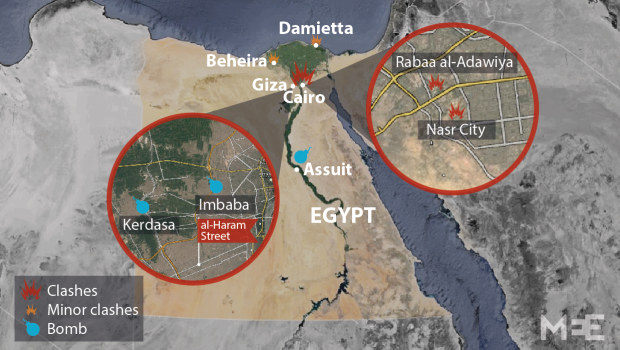Pro-Morsi protester killed in Egypt's coup anniversary clashes

A protester was killed and dozens more injured on Thursday as clashes broke out between supporters of ousted president Mohamed Morsi and security forces on the first anniversary of the coup against Morsi’s rule, pro-Morsi sources said on Thursday.
Separate incidents took place across the capital, with protesters burning tires and clashing with police throughout the day, although mass demonstrations have not yet been seen despite the Muslim Brotherhood's call for a day of rage.
According to source with the National Alliance for the Defense of Legitimacy, a pro-Morsi group, a 21-year-old protester was killed in a rally in al-Haram Street west of Cairo.
He was allegedly killed when security services fired buckshot and tear gas to disperse crowds, although the official cause of death has yet to be confirmed. Several protesters were also reportedly injured in the ensuing melee.
Clashes also broke out in the eastern Nasr City district where pro-Morsi demonstrators took to the streets, blocking main roads and trying to stop traffic on the Cairo-Suez highway.
Protesters likewise gathered nearby Rabaa al-Adawiya Square and outside the Defence Ministry, where hundreds of pro-Morsi protesters were killed last August when security services launched a brutal crackdown on their protest camp.
Smaller incidents were also reported in the Nile Delta provinces of Damietta and Beheira, although security services said they dispersed these without incident.
Tahir Square which was the epicentre of the 2011 revolution against former strongman Hosni Mubarak, was closed on Monday after at least two bombs detonated outside the Presidential Palace, killing two security service personnel.
A security source cited by the state-run Middle East News Agency said that the square would remain closed to traffic throughout Thursday in case protesters tried to assemble there. Middle East Eye correspondents on the ground confirmed that the square remained closed well into the afternoon.
Bomb blasts
Cairo witnessed several small bomb blasts in the early hours of the morning, state-owned Al-Ahram reported.
According to the newspaper, a homemade bomb exploded in the Kerdasa area in Giza, killing one man who had allegedly built the device and injuring another.
Kerdasa saw violent clashes in August 2013, when outraged Mosri supporters killed and mutilated the bodies of 15 police officers, following the security crackdown on the Rabaa al-Adawiya Square.
Further north, in the Imbaba district, the privately owned al-Masry al-Youm also said that three explosions were reported and that unidentified assailants on motorbikes threw explosives at the local police station, although no one is believed to have been hurt in the blasts.
About 250km south of Cairo, in the Assiut governorate, further explosions were reported, but al-Masry al-Youm said there were no casualties and that authorities quickly intervened to sweep the area for further devices.
On Wednesday, a car bomb exploded near Cairo’s military hospital, injuring one and causing panic in the neighbourhood.
Authorities have since arrested a man with alleged Muslim Brotherhood links for the blast.
A year of turbulence
While ousted president Morsi was elected in Egypt’s first democratic election in 2012, large-scale protests against his rule erupted on 28 June. The military subsequently intervened to depose Morsi on 3 July.
Former field marshal Abdel Fattah al-Sisi, who led the July military intervention, was elected president last month in a controversial vote boycotted by much of the opposition.
Since Morsi’s ouster, there has been a widespread crackdown on Muslim Brotherhood supporters, and increasingly other opposition groups, some of whom initially backed Morsi’s oust.
Over the past year, at least 1,400 people have been killed in street clashes, and more than 15,000 thousand have been imprisoned.
In December, the Muslim Brotherhood was declared a terrorist organisation and many of its leaders rounded up and arrested.
Recent days have seen several high-ranking members of the linked Anti-Coup alliance, also known as the National Alliance Supporting Legitimacy, imprisoned in a string of security raids.
Amnesty International on Thursday released a damning report condemning the various abuses carried out by the new authorities since Morsi's oust.
"Rampant torture, arbitrary arrests and detentions signal catastrophic decline in human rights one year after ousting of Morsi," the human rights group said.
Stay informed with MEE's newsletters
Sign up to get the latest alerts, insights and analysis, starting with Turkey Unpacked
Middle East Eye delivers independent and unrivalled coverage and analysis of the Middle East, North Africa and beyond. To learn more about republishing this content and the associated fees, please fill out this form. More about MEE can be found here.





